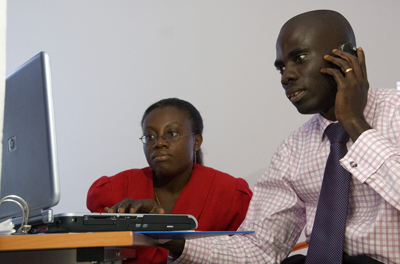Urban Community Mapping

Summary
To improve the efficiency and accountability of the government, Tanzania wanted to increase citizen-based monitoring through Information and Communication Technology (ICT) services. Increasing transparency and good governance are crucial aspects of the World Bank Country Assistance Strategy (CAS) and the Tanzanian National Strategy for Growth and Poverty Reduction. However, Tanzania lacked experience in low-cost and user-friendly infrastructure mapping and crowd-voicing tools to generate much needed good governance data. With the help of the World Bank, Tanzania participated in a knowledge exchange with Kenya, which had successfully used these strategies in Nairobi.
The exchange, which involved 20 community participants and 25 students, resulted in the collection of 2,600 data points and the first publically available, detailed map of Tandale Ward in the Tanzanian capital of Dar es Salaam. The map includes the geo-spatial coordinates of roads, water points, drainage, solid waste collection, schools, health dispensaries, shops, and homes in the area. With the success of the map, Ardhi University plans to incorporate Open Street Map technologies into its curriculum to become a regional leader in this new mapping methodology. On the decision-making level, the activities increased the awareness and skills of city officials about the link between community mapping, accountability, and public service delivery. It also brought consensus between urban planners and community members on continuing the effort.
“[The exchange helps] solve a fundamental need in Dar es Salaam for a publicly available, online mapping commons that can serve as the basis for planning of the Community Infrastructure Upgrading Project, as well as engage the community on identifying priorities and monitoring progress,” said B. R. M. Kingobi, City Director of the Dar es Salaam City Council.
Beneficiaries / Participants
Tanzania sought to increase the use of citizen-based monitoring and feedback mechanisms through Information and Communication Technology (ICT). Such services are essential to achieve efficient and participatory government. The Tanzanian National Strategy for Growth and Poverty Reduction (MKUKUTA) states that ICT is critical to increased productivity and transparency in all sectors. Moreover, the Strategy states that good governance, accountability, and participation are “bedrocks” for the overall development of Tanzania.i These opportunities are also emphasized in the World Bank Country Assistance Strategy (CAS) for Tanzania for Fiscal Years 2012-15, which includes the goal of using ICT to increase social accountability. The experience exchange was directly linked to the Bank-financed Local Government Support Project.ii Tanzania lacked experience in two important aspects: the adoption of low-cost and user-friendly urban infrastructure mapping and the use of crowd-voicing tools to generate useful local data.
Meanwhile, Kenya had extensive experience with both strategies in the Kibera area of Nairobi. Using South-South Facility funding, World Bank staff connected Dar es Salaam city planners and community leaders with experts from Kenya to help the Tanzanians increase stakeholder awareness about issues and tools related to community mapping. The exchange also increased the capacity of the Dar es Salaam City Council and other relevant institutions to systematically monitor and verify urban infrastructure and service validation. The exchange allowed citizens to use publicly available maps, visualize the city’s urban infrastructure, and submit their own community feedback.
Moving forward
The inclusion of the university and its students among the stakeholders in the capacity building represented an investment in human capital that will sustain the capacity in the city of Dar es Salaam as these students join the civil service. Furthermore, the exchange was critical for enabling consultation replication and scaling up of community infrastructure mapping. This activity set the stage for long-term technology transfer, greater public awareness and civic collaboration for geographic content generation, and improved accountability and public participation in infrastructure maintenance in Tanzania.
The exchange was also directly related to the Bank-financed Local Government Support Project. This loan had already been designed and could not be restructured, but the experience exchange enabled the Tanzanians to better engage in the local services design phase. As such, a third phase Urban Revitalization Project is expected to be prepared. This upcoming project would be a good example of a traditional Bank operation that benefits from the capacities built through the knowledge exchange to provide community urban infrastructure “voicing” via ICT.

 China
China Colombia
Colombia Denmark
Denmark India
India Indonesia
Indonesia Mexico
Mexico Russian Federation
Russian Federation Spain
Spain United Kingdom
United Kingdom